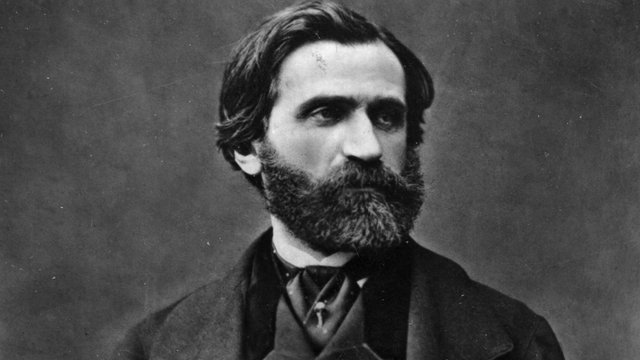


Italian composer of many successful operas in the 19th century, known for his skill to combine beautiful melody with the theatrical effect. Verdi's masterpieces, such as "La Traviata", "Falstaff" and "Aida", still dominate the operatic repertoire and Verdi is still the most performed operatic composer around the world.
Born in the difficult times of the Napoleonic wars in Italy or France (as international boundaries were shifting at that time), his musical talent was realized early. He was enrolled in a musical school in a nearby town and then, when he was 20, he went to Milano where he studied opera and concert music with private tutors as he was not admitted to the conservatory due to his older age.
In his youth, he suffered from crippling family dramas. He married early, at the age of 20, but his wife died of encephalitis very young and their children also died in infancy. Verdi was devastated by the loss of his family and struggled to find the strength to continue composing. Helped by his friends, he stood on his feet and during the following 16 years he composed a great number of operas. Later, he eventually remarried with a renowned soprano.
During his middle years, Verdi became a national idol and a prominent figure in the Italian politics. His music and personality deeply influenced the Italian culture and history. He composed the operas that are considered today as the greatest of all time ("Aida", "La Traviata", "Nabucco") and which became powerful tools used by proponents of the Italian unification. Many of his opera performances were used by the supporters of Victor Emmanuel to shout "Viva Verdi" as a code name for a secret unification message (the name "Verdi" was used as an acronym for "Vittorio Emmanuele Re D'Italia"). In 1861, Victor Emmanuel became the king of Italy and during the next 4 years Verdi entered politics and became elected in the Italian parliament. He eventually returned to composing a few years before his death.
Verdi's operas are full of emotion and their characters are quite complex personalities. To someone who was failing to grasp this complexity, he once wrote: "In the subjects proposed by you … I do not find all the variety that my crazy brain desires".
Verdi refused to follow any previous music rules and, instead, he created his own style by trusting his inspiration. He left behind him legendary music that still excites the audiences.